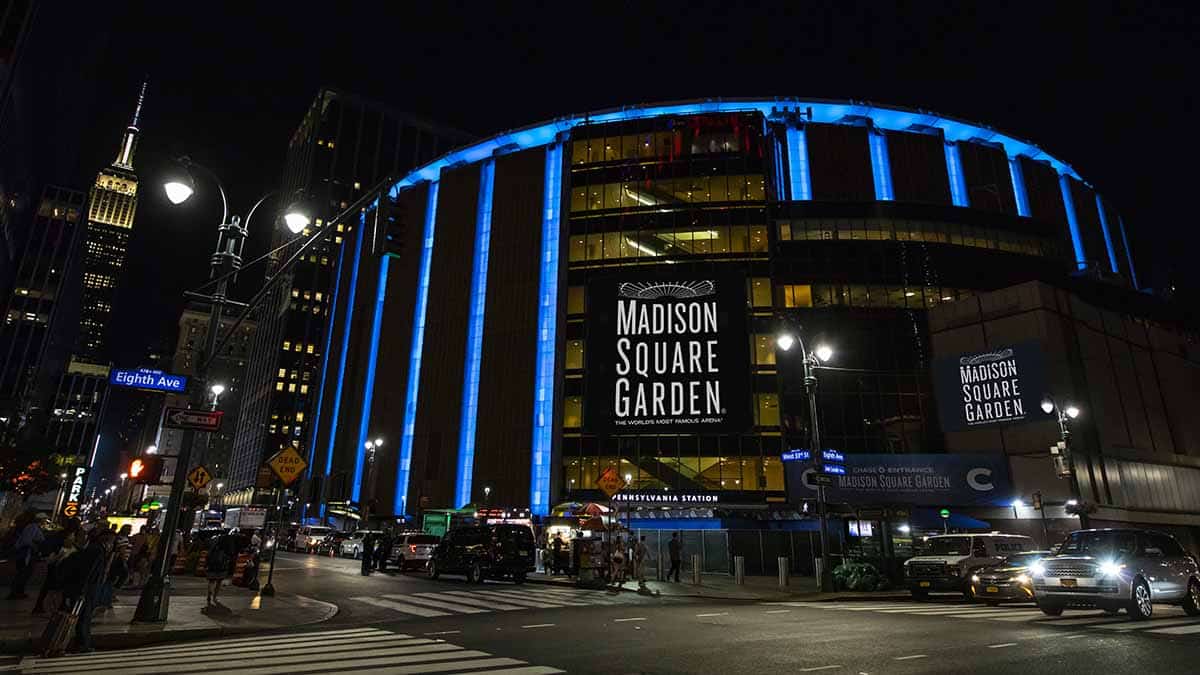In a late-session twist in Albany, New York State Senator James Skoufis introduced a new ticketing bill (S.8221) last week. In immediate response, it was apparent that the Senator had taken a sharp turn away from positions he held while drafting ticketing legislation that was submitted in January, as well as in prior sessions.
After further analysis, TicketNews has found that the new course proposed by this ticket legislation stands in direct opposition to multiple public investigations of the ticket marketplace in New York – including one led by Senator Skoufis himself.
Pitched as a reform of “predatory” ticketing practices – S 8221 and its companion Assembly bill starkly contradicts key recommendations from Skoufis’ own 2021 Senate Investigations Committee report and a 2016 New York Attorney General’s report on ticketing. The shifts have raised eyebrows in the live events industry, as consumer advocates point out the new bill’s provisions appear to backtrack on earlier pro-fan positions.
TicketNews has contacted Senator Skoufis’ office requesting information on what new research spurred these dramatic shifts away from his previous positions, but has not yet received a response as of mid-day Friday.
Divergence from 2021 and 2016 Investigations
| Issue | What the 2016 AG report called for | What the 2021 Senate report urged | S 8221 does … | Result |
|---|---|---|---|---|
| Bot enforcement | Make bot use a criminal offense with stiffer penalties. | Lifetime license revocation, per-ticket fines, whistle-blower bounty. | Deletes all new penalties; no extra reporting. | Contradicts both |
| Venue exclusivity | Warned that “walled-garden” contracts aid monopolies. | Recommended banning exclusivity deals outright. | Drops the January ban; leaves exclusives intact. | Contradicts both |
| Hold-back limits | Exposed concerts where fans saw <25 % of seats; urged transparency. | Demanded disclosure plus a 10 % cap. | Keeps disclosure (venues > 6,500 seats) but kills the cap. | Partially aligned |
| Price floors | Labeled mandatory resale floors a restraint of trade. | S 276 banned them. | Ban removed. | Contradicts both |
| Resale price ceilings | Neither investigation endorsed a cap; both stressed open resale with transparency. | Same. | Adds artist/agent-opt-in face-value cap on concert tickets. | New conflict |
| All-in pricing / fee reform | Wanted the first price shown to include all fees. | Supported “all-in” law (passed in 2022). | Retains all-in rule, sets flat 25 % fee cap. | Roughly aligned, but arbitrary |
| Refund rights | Expand refunds for indefinite postponements. | Same language. | Implements the broader refund triggers. | Aligned |
| Speculative listings | Urged ban or bold disclosure. | Full ban until broker possesses ticket and on-sale begins. | Adopts full ban. | Aligned |
Both the 2021 Senate report led by Skoufis and then-Attorney General Eric Schneiderman’s 2016 investigation identified transparency, competition, and enforcement – not price caps – as the cornerstones of fair ticketing. Skoufis’s 2021 Senate Investigations and Government Operations Committee report, for example, explicitly recommended banning exclusivity clauses in venue ticketing contracts to boost competition. It also called for stricter oversight of hidden fees and “price floors” (minimum resale price requirements), viewing such practices as anti-consumer. Both the Senate report and the AG’s office in 2016 stressed cracking down hard on illegal ticket-buying bots that hoard tickets. In line with those findings, Skoufis’s earlier bill (S.276, introduced January 2025) included lifetime bans for brokers caught using bots and full transparency measures on industry “dirty tricks,” drawing praise from consumer groups at the time.
By contrast, many of those pro-consumer measures are absent or reversed in the new S.8221:
- Exclusive Contracts: The 2021 probe concluded that Ticketmaster’s exclusive venue contracts “hurt competition and should be stopped”. S.276 sought to prohibit exclusivity clauses outright. Now, S.8221 quietly drops that ban, effectively allowing primary ticketing giants to continue locking venues into exclusive deals – a practice earlier reforms targeted for elimination.
- Price Floor Restrictions: Skoufis’s January bill also targeted restrictive price floor policies (which prevent fans from reselling tickets below a set price) as needing regulation. Such clauses, often imposed by primary sellers or teams, can force artificially high resale prices. The new bill omits any ban on price floors, marking a retreat from the prior stance that resale should be a free market where fans can sell tickets for less if they choose.
- Bot Penalties: One of Skoufis’s hallmark positions has been to get tougher on ticket-buying bots. S.276 would have imposed lifetime license revocations for brokers who use bots to snatch up tickets (an escalation of enforcement long called for by investigators). In S.8221, however, these strict anti-bot provisions have been watered down. The new draft sticks to existing penalties and reporting requirements, a notably softer stance given the 2021 report’s finding that bots “wreak havoc over inventory and must be curbed through heightened enforcement”. (Both the 2016 AG report and Skoufis’s 2021 report identified bots and illegal bulk-buying as a primary reason fans struggle to buy tickets at face value.)
These changes represent a significant shift in focus. Skoufis’s own investigative report four years ago was uncompromising in its critique of industry practices. “The Ticketmasters of the world want to perpetuate a system that allows them to continue fleecing hardworking New Yorkers,” Skoufis said in 2021, urging “long overdue reforms” to “put an end to the outright thievery that consumers face on a daily basis.”. Many of those reforms – from ending exclusive ticketing monopolies to aggressive bot crackdowns – are now notably missing or reversed in his latest bill.
A New Face-Value Resale Cap Contradicts Past Findings
Perhaps the most controversial addition in S.8221 is a provision to cap ticket resale prices at face value (with artists or promoters able to opt-in to such restrictions). This represents a dramatic departure from the recommendations of both earlier investigations, neither of which endorsed capping resale prices.
Both the 2016 Attorney General’s report and the 2021 Senate report approached skyrocketing secondary market prices as a symptom of other problems – insufficient supply and transparency – rather than something to be outlawed in itself. The AG’s 2016 investigation, titled “Obstructed View,” found that the “majority of tickets for the most popular concerts are not [initially] reserved for the general public,” thanks to widespread holds for insiders and presales. When tickets did reach the open market, brokers using bots would then resell them at a markup – but the root problem identified was that ordinary fans never even had a fair shot at face-value tickets in the first place. The report’s recommendations focused on measures like forcing resale platforms to ensure brokers are licensed, better disclosure of holdbacks, and stronger enforcement against illegal bots. Notably, it did not call for reimposing a strict price cap on resale. In fact, New York had repealed its old statutory cap on resale profits years earlier, and consumer advocates at the time argued that reinstating caps would do more harm than good.
Skoufis’s own 2021 committee report took a similar approach: it pushed for more transparency in resale (such as requiring the original face value to be disclosed to buyers on a resale listing), and it recommended banning especially egregious practices like selling speculative tickets or reselling free tickets. Yet it stopped short of suggesting any cap on resale prices. The emphasis was on making the ticket marketplace fair and open – ensuring fans could see fees upfront, know how many tickets were held back, and have the right to resell or give away their tickets freely.
By introducing a face-value resale cap in S.8221, Skoufis is proposing a pivot toward a form of price control that both previous reports arguably warned against. Consumer protection experts worry that such caps, however well-intentioned, may backfire. “A major element of the bill – a proposed 10% cap on ticket resale prices – could backfire,” wrote John Breyault, vice president of the National Consumers League, in a recent analysis of ticket laws. “While well-intentioned, resale caps often drive fans toward risky, unregulated markets such as Facebook Marketplace, Craigslist, or international resale websites.” Indeed, data from abroad supports this concern: countries that enforce strict ticket price caps (Ireland and Australia, for example) see fraudulent ticket scams at roughly four times the rate of countries with no cap (like the U.K.). In other words, when legal resale is artificially capped, a large portion of ticket exchange can get pushed into the shadows – with scammers thriving and consumers losing protections.
No evidence from either the 2016 or 2021 investigations suggested that a face-value cap would benefit consumers. On the contrary, both emphasized open resale with transparency as the safer route. In 2016, the National Consumers League praised New York’s existing pro-transfer law (which prevents primary ticket sellers from banning resale) and urged legislators to “promote competition in the sale of live event tickets” rather than restrict consumers’ rights. S.8221’s new cap on resale value appears to contradict that pro-competition approach endorsed by earlier findings. It has left many observers questioning why Skoufis – who once decried resale price caps as a distraction from the real issues – is now embracing the idea of limiting ticket prices by law.
Questions of Motive Amid Live Nation Antitrust Concerns
The timing and industry context of S.8221 have added another layer of scrutiny. Its introduction comes as Live Nation Entertainment (parent of Ticketmaster) is facing a massive antitrust lawsuit from the U.S. Department of Justice and more than 30 state attorneys general – including New York’s own AG, Letitia James. That DOJ case, filed in May 2024, accuses Live Nation-Ticketmaster of maintaining an illegal monopoly in the live events sector. Among the chief allegations is that Live Nation uses exclusive venue contracts to block competition and drive up prices, thereby “abus[ing] its market power” and harming consumers. New York’s AG James has been outspoken, saying it’s time to “end the era of Live Nation’s excessive market power” that leaves fans with fewer choices and inflated costs.
Against that backdrop, some elements of Skoufis’ new bill strike critics as perplexingly aligned with Live Nation’s interests. Most glaring is the removal of the exclusivity ban – essentially giving Ticketmaster a continued green light to secure exclusive ticketing deals with New York venues, cementing its dominance. This omission directly contradicts Skoufis’s prior stance and even undercuts the spirit of the state’s antitrust fight, which highlights venue exclusivity as a anticompetitive problem. It has not gone unnoticed that Skoufis dropped the very provision that would challenge Ticketmaster’s venue stranglehold, even as New York’s Attorney General is in court arguing that such strangleholds violate the law.
Additionally, industry watchdogs point out that the new resale price cap could further tilt the playing field in Live Nation’s favor. Why would Ticketmaster welcome a cap on resale prices? In practice, a face-value cap (especially one that artists or their Ticketmaster-aligned managers can opt into) would funnel more resale activity through controlled channels. Ticketmaster has already developed “SafeTix” technology that can block ticket transfers and force fans to resell only on its official exchange. If above-face-value resale is outlawed for certain events, fans who can’t attend may be compelled to use the primary platform’s face-value exchange or lose out entirely – eliminating the competitive pressure from independent resale marketplaces. As the Sports Fans Coalition warned, empowering Ticketmaster and its client artists to dictate resale terms is “a trap”. With tools like SafeTix, “Ticketmaster can block transfers, force resale through its own platforms, collect your data, [and] squash any chance of marketplace competition,” effectively picking winners and losers in the resale market. In short, limiting resale prices could strengthen Ticketmaster’s grip by driving more transactions into its walled garden (or else onto the streets). That outcome is the opposite of what New York’s ticketing reforms originally set out to do.
It’s a striking irony: at the very moment New York’s top prosecutor is fighting to open up the ticketing market, New York’s legislature is considering a bill that, critics argue, would lock it down further in some respects. S.8221 does contain some strong pro-consumer measures – for instance, it mandates disclosure of ticket holdbacks by sellers (though only for venues above 6,500 seats, a threshold some say should be lower), and it provides for refunds if events are postponed beyond 3 months, closing a loophole that burned fans during recent tour delays. The bill also includes protections for season ticket holders against punitive action by teams for reselling their tickets. These elements show Skoufis is still pushing certain reforms that align with his past work and the findings of investigations (both 2016 and 2021 reports advocated better transparency on holdbacks and fair refund practices). But consumer advocates worry that the new additions and omissions in S.8221 tip the scales toward the industry’s biggest player. As the Sports Fans Coalition put it regarding the bill, “we applaud [the] consumer protections… but granting Ticketmaster [the ability to] tighten their grip and control prices undermines everything this legislation aims to do.”
Lack of Explanation for the Policy U-Turn
What prompted Senator Skoufis to reverse course on measures he once heralded, and to insert a resale price cap that his own prior investigation didn’t call for? So far, the senator has offered little public explanation. TicketNews has contacted Senator Skoufis’ office multiple times seeking clarification on the reasoning behind these late-session changes in S.8221, especially in light of the contradictions with his 2021 report and the 2016 AG study. As of publication, no response has been provided. Skoufis did hold a press conference on May 28 touting the bill as a crackdown on “predatory” practices – emphasizing that marked-up resale is “abusive to fans and artists” and that a 25% cap on fees and stricter bot rules would help consumers. However, he did not directly address the removal of the exclusivity ban or the other rollbacks from his January proposal during that announcement.
Observers note that the political winds around ticketing reform are complex. Powerful industry stakeholders – venues, promoters, primary ticketers – have lobbied fiercely in Albany, and some of Skoufis’s initially tough measures faced resistance in negotiations. It’s possible that the new bill (coming in the final weeks of the legislative session with the clock ticking on renewing New York’s ticketing laws) reflects compromises made behind closed doors. Still, the end result is a proposal that, in the eyes of many consumer advocates, conflicts with the spirit of Skoufis’s earlier work.
Skoufis’s 2021 investigation was lauded for taking on Ticketmaster and illuminating how both primary and secondary markets were failing fans. That report led to sweeping recommendations – many of which were put into bill form in S.276 and even passed the Senate in prior sessions. Now, by advancing a bill that omits some of those very recommendations and adds a contentious price cap, Skoufis has invited questions about Albany’s commitment to the reforms that were, until recently, broadly agreed upon. Lawmakers have only weeks to act before current ticket regulations expire this summer. As the session winds down, fans and industry watchers will be keeping a close eye on whether S.8221 moves forward and, if so, whether it does so with or without the provisions that seemingly favor the industry’s dominant player.
In the end, the new ticketing legislation has become a case study in the push-pull between consumer protection goals and industry influence. The contradictions between S.8221 and the findings of 2016 and 2021 are stark: a bill that was supposed to implement lessons learned from prior investigations instead diverges from them. Without clear justification from Senator Skoufis, the onus falls on the legislative process to reconcile these differences. New Yorkers frustrated by high ticket prices and limited access can only hope that any final reforms truly address the problems documented over years of investigation – rather than undermining those hard-won insights in the eleventh hour.
Sources
- 2016 NY Attorney General report (PDF):
https://ag.ny.gov/sites/default/files/reports/Ticket_Sales_Report.pdf - 2021 NY Senate Investigations & Government Operations Committee report (PDF):
https://www.nysenate.gov/sites/default/files/article/attachment/nys_senate_igo_committee_report_-_live_event_ticketing_practices.pdf - Senate Bill S 276 (January 2025 text):
https://www.nysenate.gov/legislation/bills/2025/S276 - Senate Bill S 8221 (May 2025 text):
https://www.nysenate.gov/legislation/bills/2025/S8221 - NY AG Letitia James press release on DOJ/Live Nation lawsuit (May 2024):
https://ag.ny.gov/press-release/2024/attorney-general-james-joins-doj-suit-ticketmaster - TicketNews coverage of Skoufis & Kim at Coalition for Ticket Fairness conference (Feb 2025):
https://ticketnews.com/2025/02/holdbacks-under-fire-ny-lawmakers-discuss-ticketing-overhauls-at-ctf/ - National Consumers League statement on resale price caps (May 2025):
https://nationalconsumersleague.org/2025/05/statement-on-new-york-ticket-resale-price-caps/ - Spectrum News NY1 clip of Skoufis May 28 press conference:
https://spectrumlocalnews.com/nys/central-ny/politics/2025/05/28/skoufis-ticketing-bill-press-conference - Sports Fans Coalition analysis of S 8221 / A 8659 (May 2025):
https://sportsfans.org/2025/05/analysis-new-york-ticket-bill-s8221/



